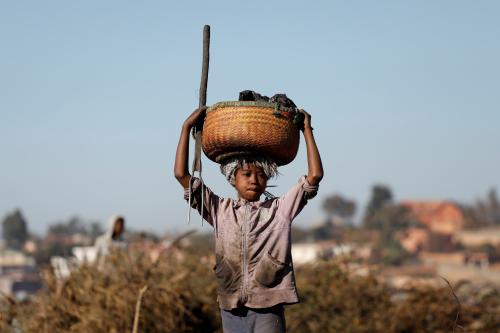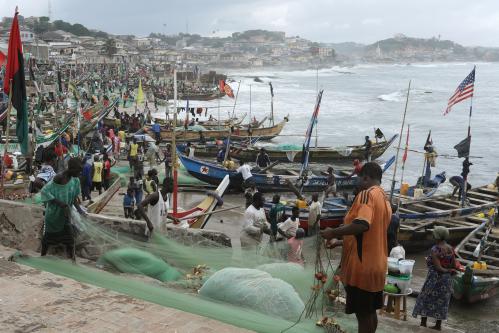Russia hosts first Africa heads-of-state summit: On October 23-24, Russia hosted its first-ever summit with Africa. Representatives from all 54 African states, including 43 heads-of-state or government, attended the summit, which aimed to revive Russia’s economic, political, and military influence in Africa.
Figure 1 shows the countries with which Russia made deals—including statements of cooperation and memorandums of understanding that may not be fulfilled—at the summit in the areas of military and politics, energy, and trade. Among them are a contract to supply attack helicopters to Nigeria, talks between Russian state nuclear company Rosatom and Ethiopia to develop nuclear power in Ethiopia, and deals for oil and gas cooperation with the Republic of the Congo, Equatorial Guinea, Morocco, and South Sudan. During the summit, Russian President Vladimir Putin called for Russia’s trade with African countries to double over the next four to five years. Putin also stated that Russia had forgiven African debts worth over $20 billion.
Figure 1: Deals made at the Russia-Africa Summit
 Source: The Moscow Times.
Source: The Moscow Times.
While Russia’s trade with Africa has increased in recent years—its exports to Africa reached $20 billion in 2018, double the level of trade in 2015—its economic involvement with the continent is dwarfed by countries such as the U.S., China, and France. To begin to compete with these countries, Putin has promised cooperation without “political or other” interference.For more on Russia-Africa relations, see Landry Signé’s recent opinion piece, “Vladimir Putin is resetting Russia’s Africa agenda to counter the US and China.”
Botswana, Mozambique elections update
Botswana held a general election on Wednesday, October 23, with citizens voting on seats for 57 national assembly members and 490 local government representatives. On Friday, Chief Justice Terrence Rannowane announced that incumbent President Mokgweetsi Masisi was re-elected, as his ruling Botswana Democratic Party won more than the required 51 percent of parliamentary seats, though counting is still ongoing.
Meanwhile, vote counting over Mozambique’s October 15 election is ongoing, with incumbent President Filipe Nyusi and his Frelimo party expected to win by a large margin. Frelimo is also expected to win a majority in all 10 of Mozambique’s provincial assemblies, giving the party the power to choose all provincial governors. At the same time, the opposition Renamo party, wary of reported results in even in its strongholds, is claiming fraud and irregularities.
IMF and World Bank cut Africa growth projections
Last week, the International Monetary Fund (IMF) and World Bank held their annual meetings in Washington, D.C. Both institutions updated their growth forecasts for Africa, showing the continent growing slower than expected. The World Bank lowered growth estimates for 2019 to 2.6 percent from its 2.8 percent April estimate while the IMF lowered its projections to 3.2 percent from 3.5 percent previously. According to the World Bank, the regions’ three largest economies – Angola, Nigeria, and South Africa—are all expected to grow more slowly in 2019 than previously expected. Growth is expected to pick up in 2020 and 2021. While the IMF highlighted that sovereign debt levels are stabilizing in African countries with average debt-to-GDP at 55 percent, seven countries are currently in debt distress and a further nine are categorized as being at high risk of debt distress.






Commentary
Africa in the news: Russia-Africa summit, Botswana’s election, and Africa’s new growth projections
October 26, 2019